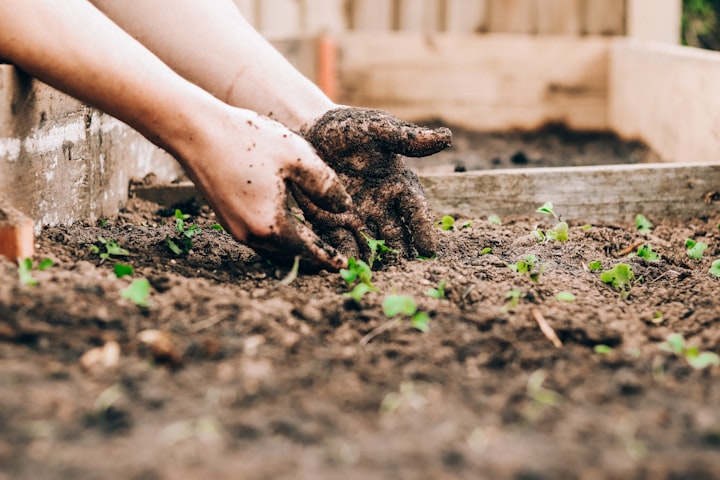
Once upon a time in a small suburban neighborhood, there lived a woman named Lily. She had always been fascinated by the beauty and resilience of nature, and she found solace in her backyard garden. To her, tending to plants was not just a hobby; it was a way to understand life's journey and find healing for her own soul.
Lily had faced many challenges throughout her life. She had experienced heartbreak, loss, and the sting of failure. But through it all, she discovered that the garden held valuable lessons for personal growth and transformation.
One day, as Lily was meticulously planting tiny seeds in the rich soil, she marveled at the potential they held. Each seed was like a dormant dream, waiting to sprout and blossom into something magnificent. Lily saw herself in those seeds—full of unrealized potential and waiting for the right conditions to flourish.
As she watered her plants and watched them grow, Lily noticed how they faced various obstacles, much like humans do. Some plants struggled to break through the soil, fighting against the weight of the earth above them. Others faced harsh weather conditions, bending and swaying but never giving up.
One particular rosebush caught Lily's attention. It had been battered by a storm, its delicate petals bruised and torn. But instead of withering away, the rosebush showed resilience. It stood tall, determined to heal and grow stronger. Lily saw her own scars in the rosebush's damaged petals, and she understood that resilience was not about avoiding pain but rather about finding strength in the face of adversity.
Over time, Lily's garden became a sanctuary where she learned to embrace change. She observed how plants shed their leaves in the autumn, symbolizing the importance of letting go of what no longer served them. The garden taught her that change was an essential part of growth, and it was in the process of shedding old patterns and beliefs that one could make room for new beginnings.
Lily also discovered the significance of patience in her garden. She realized that growth didn't happen overnight. It required nurturing, dedication, and a deep understanding that each plant had its unique pace. Some plants bloomed quickly, while others took years to reach their full potential. Lily learned to extend the same patience and grace to herself, understanding that personal growth had its own timeline.
As seasons passed, Lily's garden became a reflection of her emotional journey. Just as plants evolved and transformed, so did she. She embraced the ebb and flow of life, knowing that the darkest nights would always be followed by the dawn of a new day.
One summer evening, as Lily sat in her garden, surrounded by blooming flowers and buzzing bees, she realized the profound impact her plants had on her own growth. Through their resilience, adaptability, and innate ability to thrive, they had taught her to embrace life's challenges, learn from them, and keep moving forward.
Lily understood that her garden was not just a collection of plants; it was a metaphor for her own existence—a reminder that even in the harshest conditions, she could find the strength to blossom and transform. And in that moment, she felt a deep sense of gratitude for the lessons she had learned, both from her garden and from within herself.
Gardening can be used by individuals and governments in a variety of ways to promote personal well-being, community participation, and sustainable development. Here are some examples of how gardening might be used:
Personal Gardens: Individuals can create their own gardens, no matter how small or large their living spaces. Even a balcony or windowsill can be transformed into a thriving garden with potted plants or vertical gardening techniques. By engaging in personal gardening, people can experience the numerous benefits it offers, including stress relief, connection with nature, and the joy of growing their own food.
Community Gardens: Community gardens provide shared spaces where individuals can come together to grow plants and vegetables. These gardens foster a sense of community, allowing people to connect, share knowledge, and collaborate on gardening projects. Community gardens also promote sustainable food production, encourage healthy eating habits, and can serve as platforms for education and skill-sharing.
Therapeutic Horticulture: Therapeutic horticulture programs can be applied in a variety of settings, including hospitals, rehabilitation institutions, and community centers. Gardening activities are used as a type of therapy in these programs to enhance physical, mental, and emotional well-being. Individuals can experience the healing power of nature and gain new skills while engaging in meaningful activities by introducing gardening into therapeutic programs.
School Gardens: Integrating gardens into educational curricula offers numerous benefits for students. School gardens provide hands-on learning experiences, allowing children to understand concepts related to biology, ecology, and sustainable agriculture. Gardening in schools also teaches children about nutrition, healthy eating habits, and environmental stewardship. Additionally, school gardens promote physical activity and can serve as platforms for community involvement and intergenerational learning.
Urban Agriculture: Urban agriculture initiatives, such as rooftop gardens, vertical farming, and urban farming cooperatives, allow communities to produce food in urban settings. These initiatives help increase access to fresh produce, improve food security, and reduce the environmental impact of long-distance food transportation. Urban agriculture also creates opportunities for employment, entrepreneurship, and community empowerment.
Government Policies and Incentives: Governments can play a vital role in promoting gardening by implementing supportive policies and incentives. This can include providing land or financial assistance for community gardens, offering tax incentives for urban agriculture initiatives, integrating gardening into educational curricula, and supporting research and development in sustainable agriculture practices. Government initiatives can also focus on raising awareness about the benefits of gardening and promoting the use of public spaces for community gardening projects.
By tapping into gardening, both individuals and governments can create a positive impact on personal well-being, community building, and sustainable development. Gardening offers a multitude of opportunities for people to connect with nature, foster a sense of belonging, and contribute to a healthier and more sustainable future.
About the Creator
Kelvin
My name is Kelvin, I am a passionate writer with expertise in Business, Personal Finance, Health, and Wellness and also general stories. Anything at all catches my attention to write a story.





Comments (1)
Hello, AI is permitted on Vocal. It is a Vocal policy that content created with AI is identified as such at the start of the story/article. Your article/story has many hallmarks of AI-assisted/generated content. You can find the details of the Vocal policy here: https://vocal.media/resources/an-update-from-vocal-on-ai-generated-content, Please amend your piece to be in compliance. If you are not a Vocal+ member you will need to contact Vocal here ([email protected]) and ask them to edit your story/article/poem for you. If you don’t correct this the content may be removed by Vocal and/or you may be deleted from the platform.